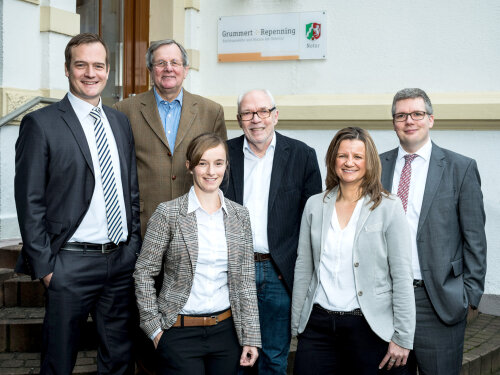Best ADR Mediation & Arbitration Lawyers in Germany
Share your needs with us, get contacted by law firms.
Free. Takes 2 min.
Or refine your search by selecting a city:
List of the best lawyers in Germany
About ADR Mediation & Arbitration Law in Germany
In Germany, Alternative Dispute Resolution (ADR), including mediation and arbitration, serves as a complement to traditional court proceedings. ADR provides parties with a more flexible, confidential, and often faster and less expensive means to resolve disputes. Mediation involves a neutral third party who facilitates dialogue between disputing parties to help them reach a voluntary agreement. Arbitration, on the other hand, entails a private dispute resolution process where an arbitrator makes a binding decision after evaluating the evidence and arguments. ADR is supported by a legal framework that encourages its use for commercial, contractual, and even some family disputes, emphasizing efficiency and autonomy of the parties involved.
Why You May Need a Lawyer
While ADR processes aim to be more straightforward than court proceedings, legal assistance can be crucial for several reasons. If you're involved in a complex commercial contract dispute, navigating the nuances of arbitration clauses, regulations, and procedures can be intense. Lawyers can provide guidance on rights, obligations, and strategic approaches. Additionally, when entering mediation, a lawyer can prepare you to negotiate effectively and ensure that any agreements reached are legally enforceable. Legal advice may also be necessary to handle cross-border disputes where international arbitration parties are involved or when enforcing an arbitral award is required either domestically or abroad.
Local Laws Overview
German law encourages the use of ADR through various legal provisions. The Mediation Act of 2012, which defines the role and process of mediation, aims to promote quicker and amicable settlements. Arbitration is governed primarily by the Tenth Book of the German Code of Civil Procedure, which adheres closely to the UNCITRAL Model Law, providing a structured framework for conducting arbitration. Specific regulations outline procedural aspects, including the formation of the arbitral tribunal, determination of the substantive law, evidentiary rules, and recognition and enforcement of arbitral awards. German legislation supports ADR in commercial matters while also occasionally integrating ADR mechanisms in family and labor law contexts.
Frequently Asked Questions
What is the main difference between mediation and arbitration?
Mediation is a facilitated negotiation with a mediator helping parties reach a mutual agreement. Arbitration involves a binding decision by an arbitrator, similar to a court judgment.
Is an agreement reached in mediation legally binding?
An agreement reached in mediation becomes legally binding once it is formalized in a contract or settlement agreement signed by the parties.
How are arbitrators chosen in Germany?
Arbitrators are generally selected by mutual agreement of the parties involved or, failing that, through appointment by a designated arbitration institution.
Can arbitration agreements be enforced under German law?
Yes, arbitration agreements are typically enforceable, provided they meet statutory requirements, including the written form set out in the German Code of Civil Procedure.
What types of disputes are suitable for ADR in Germany?
ADR is commonly used in commercial, contractual, family law, and labor disputes, particularly where parties seek a confidential and swift resolution process.
How long does the arbitration process usually take in Germany?
The arbitration process can vary in length but typically takes less time than court proceedings, ranging from several months to about a year, depending on complexity.
Are ADR processes confidential?
Yes, confidentiality is one of ADR's key advantages, with both mediation and arbitration procedures conducted privately.
What costs are involved in ADR processes in Germany?
Costs can vary widely, with consideration for factors like the mediator's or arbitrator's fees, legal representation costs, and administrative fees of any involved arbitration institution.
Can an arbitration award be appealed?
Arbitration awards are final and binding, with very limited grounds for appeal, typically addressing procedural fairness or public policy violations.
Where can I find qualified mediators or arbitrators in Germany?
Qualified mediators and arbitrators can commonly be found through arbitration institutions or professional organizations specializing in ADR services.
Additional Resources
Several organizations can provide further assistance, including the German Institute of Arbitration (DIS), which offers guidance on the arbitration process and a network of ADR professionals. For mediation, consider consulting the German Federal Association for Mediation (BM) for listings of registered mediators and additional mediation resources. Governmental legal aid offices or bar associations may also offer initial guidance or referrals to specialized ADR legal professionals.
Next Steps
If you require legal assistance in ADR mediation and arbitration, consider reaching out to a lawyer specializing in this field. Begin by identifying your specific needs and seeking referrals from professional associations or legal directories. When choosing a lawyer, evaluate their experience in ADR processes, understanding of relevant laws, and ability to navigate both domestic and, if necessary, cross-border disputes. Consider arranging an initial consultation to discuss your situation, options, and potential strategies to achieve a favorable resolution.
Lawzana helps you find the best lawyers and law firms in Germany through a curated and pre-screened list of qualified legal professionals. Our platform offers rankings and detailed profiles of attorneys and law firms, allowing you to compare based on practice areas, including ADR Mediation & Arbitration , experience, and client feedback.
Each profile includes a description of the firm's areas of practice, client reviews, team members and partners, year of establishment, spoken languages, office locations, contact information, social media presence, and any published articles or resources. Most firms on our platform speak English and are experienced in both local and international legal matters.
Get a quote from top-rated law firms in Germany — quickly, securely, and without unnecessary hassle.
Disclaimer:
The information provided on this page is for general informational purposes only and does not constitute legal advice. While we strive to ensure the accuracy and relevance of the content, legal information may change over time, and interpretations of the law can vary. You should always consult with a qualified legal professional for advice specific to your situation.
We disclaim all liability for actions taken or not taken based on the content of this page. If you believe any information is incorrect or outdated, please contact us, and we will review and update it where appropriate.
Browse adr mediation & arbitration law firms by city in Germany
Refine your search by selecting a city.














